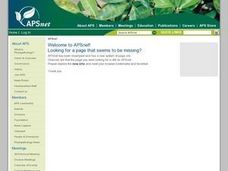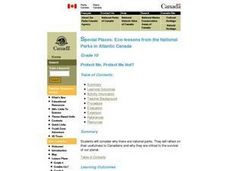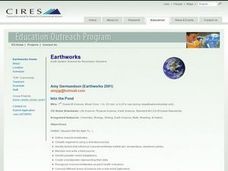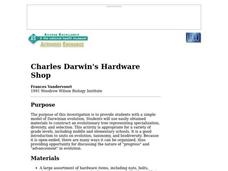Curated OER
Planet of Plenty
Students examine a small piece of land to determine the diversity of life on Earth. They role play as visitors from outer space seeing life on Earth for the first time. They measure and observe their plots while working in small groups....
Curated OER
Dinoflagallates of Bioluminescent Bay
Fifth graders research dinoflagallates of the Bioluminescent Bay. They research the Internet for pictures of the Bio Bay and discuss the difference between ecosystems and ecoregions. They research a marine ecoregion and create a poster.
Curated OER
Project Wetlands
Students develop a joint undertaking designed to solve an environmental problem in their local community. They tackle the problem of erosion of banks and chemical run-off into a nearby lake, which is within walking distance of school.
Curated OER
Water Molds (Oomycetes)
Students research a group of fungus-like organisms; the Oomycetes, by baiting them from natural sources (water and soil) and observing them.
Curated OER
Who's the Baddest?
Students are introduced to the realm of social insects, their role in the environment and the biological features that make them unique.
Curated OER
Water Molds (Oomycetes)
Students explore a group of fungus-like organisms; the Oomycetes, by baiting them from natural sources (water and soil) and observing them.
Curated OER
National Parks in Atlantic Canada
Tenth graders research and discuss factors that have an effect on the sustainability of national park ecosystems in Canada. They examine changes in thinking that have led to new park management practices.
Curated OER
Protect Me, Protect Me Not?
Students brainstorm natural resources found in Canadian National Parks. They, in teams, defend and support conservation efforts and give a presentation. Evaluation consists of speaking on both pro and con sides of a national parks' issue.
Curated OER
Catch Me if You Can
Third graders investigate behavioral and physical adaptations, such as camouflage, that allow animals to respond to life needs.
Curated OER
The Wildland/Urban Interface Dilemma
Students examine all sides of the issues surrounding wildland fire. Groups assume the roles of different people who must decide what to do about a fictitious wildfire. They have a discussion to analyze the issue. A good, real life lesson!
Curated OER
Into the Pond
Seventh graders use a pond to explore macroinvertebrates and other organisms. They use a dichotomous key to classify the organisms and maintain a journal recording their findings.
Curated OER
Aquatic Insects: Water Quality Index & Diversity Index
Students search stream beds to study the life cycle and adaptations of stream insects. They explore creeks and streams to see the diversity index of creeks or streams and to find the water qualit index.
Curated OER
Spinning the Eco Web
Students examine the components and relationships of ecoregions and ecosystem management. They define ecoregion and ecosystem, list ecoregions, and participate in a simulation that demonstrates the connections between parts of the...
Curated OER
Wisconsin Birds Lesson Plan
Students, during an outdoor hike, are taught about the different types of birds found in Wisconsin.
Curated OER
New Mammal Species Found
Learners brainstorm ideas about rodents, mammals and new discoveries. They describe rodents and participate in pre-reading activities. They read, discuss, and complete role play activities based on an article on the discovery of a new...
Curated OER
Survival Features
Third graders identify features of producers, herbivores and carnivores. They discuss the features that aid in survival for those animals. They organize animals into categories to complete the lesson.
Curated OER
In the Scheme of Things
Fifth graders examine the food webs of different animals. They discuss the characteristics of those animals as well. They work together to develop their own definition for the word niche.
Curated OER
Natural Inquirer
Students interview wildlife experts to gain information needed to research and write a report about an aquatic plant or animal affected by climate change.
Curated OER
What's That? Diversity Among Organisms
Seventh graders can go outside and explore the organisms that live in the environment outside their door. This is a wonderful opportunity for students to examine the world around them with a new perspective. This activity will increase...
Curated OER
Community Action
Fifth graders brainstorm a list of decisions that students make daily that affect the welfare of the environment categorizing them as being either helpful or harmful. They then trace local actions to distant consequences to determine how...
Curated OER
One Square Meter
Students examine various ecosystems using scientific inquiry. Using the local area, they assess the characteristics and conditions in one square meter. They report their findings in the form of a survey map and data sheet. They...
Curated OER
Charles Darwin's Hardware Shop
Young scholars construct an evolutionary tree representing specialization, diversity, and selection using easily obtained materials. They use at least twenty pieces of hardware to classify then develop "evolutionary" relationships...
Curated OER
Evolution: Adaptation
Tenth graders practice new skills and apply them. The skills of research should motivate them to want more knowledge. The concept of adaptation is used as a context for the lesson of practicing research skills.
Curated OER
Communication in Bees
Eighth graders identify and interpret a scientific investigation and a hypothesis through experimentation and testing a hypothesis. They identify what scientists hypothesized about the communication of stingless bees. Finally, 8th...
Other popular searches
- Biodiversity and Ecosystems
- Biodiversity in Forests
- Biodiversity Loss
- Insect Biodiversity
- Great Lakes Biodiversity
- Marine Biodiversity
- Biodiversity of Fish
- Climate and Biodiversity
- Global Biodiversity
- Hall of Biodiversity
- Biodiversity in Utah
- Biodiversity Bingo























